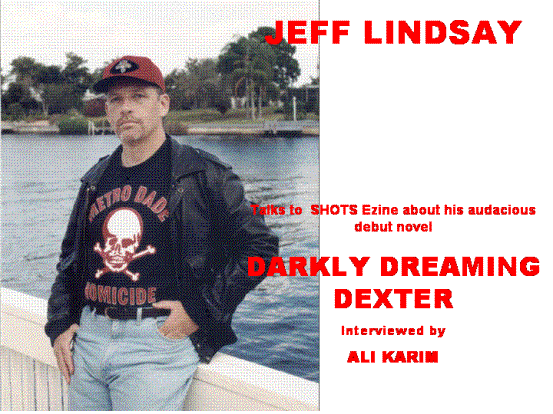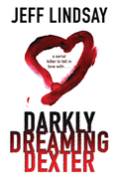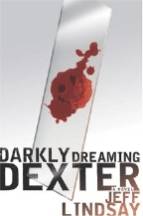

|
Jeff Lindsay speaks to Ali Karim for Shots Ezine© Ali Karim |

|
|
One of my delightful finds in 2004 was a very different spin on the serial killer sub genre by a newcomer to crime-fiction - Jeff Lindsay. So what is Darkly Dreaming Dexter all about?Dexter Morgan is not your average, everyday kind of guy. Sure, he's likable, although he is rather bewildered by the attentions of women. He can be charming and witty, and he's always supportive of his foster sister, Deborah, a Miami vice squad cop. But Dexter leads one hell of a double life. During the day, he's a blood-splatter lab technician with the Miami Police Department. At night, he's a serial killer with a marked difference: he only slays bad people (as if that excuse will save him from the electric chair). Orphaned by tragedy as a boy, he was adopted aged 4 by a cop, Harry Morgan, who set about trying to channel his new son's animal nature, his aberrant "need." It was Harry who convinced Dexter only to prey upon other killers - such as the paedophiliac priest whom he dispatches at the beginning of the book. But with thirty-six kills to his name, Dexter suddenly finds that he has a competitor. This newcomer is responsible for the gruesome murders of prostitutes. Not only does he take their lives, but he drains their blood and wraps up their body parts like prized possessions.Though Dex admires the technique, which mirrors his own modus operandi, he decides to help his sister solve these serial slayings - a fateful decision that will compel him to question his own life. Could Dex Morgan, "the best-dressed monster in Dade County," be more involved in these abominations than even he realizes? I'll just say that Lindsay's readers won't be the only ones surprised by this tale's outcome. Written with a playful and hip style, Darkly Dreaming Dexter manages to avoid farce or to tumble into bad taste. This is a very different and entertaining work and definitely worth searching out, so Shots ezine tracked down the author to talk about his work. |
|
|
Welcome to Shots ezine. Jeff as youíre new to the UK crimescene can you tell us a little about your youth? No surprise, really, but I grew up in Miami. My father was an art professor, and I was a late-bloomer, so I was always smaller than everyone else my age. I got in a lot of fights because I wouldnít back down from bullies. That drove me into sports and exercise, which still occupy a lot of my time, but it also made me into a bit of a loner, and I read an awful lot. |
|
|
What books did you read early, that either influenced you, or made you take up the pen? I donít know about influence. I read almost everything. I read all of Edgar Rice Burroughs about a dozen times. When I got older, it was John D. MacDonald. Believe it or not, I think P.G. Wodehouse was an influence. And I think Robertson Davies and Patrick OíBrian were two of the greatest writers of our time, though Iím not sure they influenced me at all. When I got interested in theatre, a lot of my reading was in that area. Shakespeare and Wilde and Shaw and Pinter, of course, and Sam Shepard and David Mamet, but I also became totally intrigued with the Jacobeans. Iím the only guy I know who ever directed a production of Revengerís Tragedy by Cyril Turneur. Oh - but you say "produced" in the UK, right? For the person who tells everyone where to stand and what kind of face to make? |
|
|
Have you been an advocate of the crime/mystery/thriller genre? Not really. Iím really more interested in the arts, history, music - everything from rock to opera. Iíve had about 17 separate careers in different areas, but they all keep leading back to writing, so I finally gave up, and thriller is just what came out. I do read some mysteries, and I think Elmore Leonard, for example, is awfully good. But I donít think Iím an advocate. If I was, Iíd be pushing for Raymond Chandler and Mickey Spillane to be taken seriously as writers. |
|
|
A writer once told me that the most interesting people (writers or characters in novels) are the ones with some personal trauma that splintered their youth. Did you have any trauma or incident that perhaps helped mould you in some way? And if so would you be prepared to share that incident with us? Well, as I said, I was awfully short until just before college. I donít know if that counts. I was usually very unhappy, misunderstood, and without a girlfriend until I got older. Sort of standard pubescent anguish, I guess. No one ever raped me with hedge clippers or anything. Sorry |
|
|
What were your early experiences as a writer like? Have you always written? My earliest writing was a serial novel I used to send to a girl I had a crush on since I was about 5. She lived on the other side of the country, and Iíd mail her a new chapter every month or so. I always thought Iíd end up marrying her, but my wife persuaded me otherwise. When I was 6 or 7 I had some poems published in an anthology of childrenís poetry. And then when I was in high school, I wrote a play for an independent project. |
|

|
Click on the following link to read an extract from Jeffís book: www.orionbooks.co.uk/extras/JeffLindsay_DarklyDreamingDexter.pdf |
|
So tell me a little about your work as a playwright? Well, I thought I wanted to be an actor. But I kept getting into situations where somebody was looking for a new play, and I would dash one off. It gradually occurred to me that I was good enough, or different enough, to be doing that. So I went back to university and got a double MFA - in Directing and Playwriting - and started working with a couple of experimental theatre companies. I ended up in permanent residence with one of them in Los Angeles. We were all so stupid we thought we could work for television and movies to pay for our theatre. But a couple of my plays have been done in Los Angeles, Santa Barbara, Key West, New York, Pittsburgh, Miami - one of them even had a brief and very humble run in London. |
|
|
And whatís this about karate? Naturally it goes back to being small and picked on as a child. I dabbled when I was young and in university, and then when I wanted to get my daughter involved I went back to it with her. We did Shito Ryu Kai, a traditional Japanese form, do you know it? |
|
|
Yes I do, but I trained in Kyokushinkai during university; so did you compete at tournament level? Yes, I did a lot of tournaments, culminating with the World Championships right after I got my Black Belt. Because of that, and my age, they stuck me in the Masterís Division with some very serious guys whoíd been doing it forever. I was scared to death. But I was also the announcer for the tournament, and sang the anthem, so I had to change out of my blazer and tie and into my gi so fast I forgot to be nervous, and took the Silver Medal. Also broke my foot in four places delivering a terrific kick to the ribs. But getting hurt goes with the turf when youíre a Black Belt. |
|
|
I hear you also work in TV broadcasting in Florida. Can you tell us a little about this side of your life? Yeah, I hosted a couple of shows for Public Broadcasting, which is our commercial-free channel. On one of them I moderated a panel of media people and weíd talk about issues involving press coverage, racial and gender bias in reporting and so on. The other was what they call a "magazine" show on the arts. I was the host and I did one of the stories for each show. |
|
|
And I hear youíve published non-fiction before Darkly Dreaming Dexter? I wrote a column that was in 3 or 4 newspapers for about 5 years. It was called "Fatherhood." Started when my wife was producing TV news, which meant she was never home, and suddenly I was primary care-giver to a couple of young and very different daughters. I would write about shopping for that first bra - she thought it was funny, and I wanted to crawl under a rock. Stuff that most men donít have to face, and some stuff we all do, like what to tell the little one when her beloved goldfish dies. It was mostly non-fiction, though I did stretch the truth sometimes - my kids never actually set fire to the sofa and pushed it into the pool. It was just smouldering a little. |
|
|
So what made you decide to write about this unusual serial killer Dexter Morgan? I donít know - it just came to me. I was speaking at a business boosterís lunch, I donít know why, and I looked out at the crowd, and thought, "serial murder isnít always a bad thing." Just popped into my head, canít explain it. |
|
|
Did you read extensively within the serial killer sub-genre before embarking upon Darkly Dreaming Dexter? No, not a thing. Several reviewers have commented on the fact that Dexter "breathes life into a tired genre." If true, itís because I had no idea it was tired. I donít read any of them. I guess I should now. |
|
|
And what do you make of the works of Thomas Harris? I really liked The Silence Of The Lambs. But I saw the movie first. I read the book later and thought it was pretty good. |
|
|
Did you plot extensively, or do you let the muse take you where it may? I have to plot the whole thing out, but I donít always stick with it. The thing with the Barbie dolls, for instance, was a total surprise to me when it came out. |
|

|
How dangerous is mixing humour with such a dark topic? For me, I think itís dangerous NOT to. For people who do humour or comedy, itís a reflex. You canít stop it and you canít really control it. |
|
And why did you choose to use first person narration as the vehicle to tell this tale? I just thought that would be interesting, and that it would keep me challenged. Also, with my acting background, it seemed like a fun exercise in exploring a character who is very unlike me. |
|
|
There is a real streak of gallows humour running through Darkly Dreaming Dexter, but were you worried about falling off the edge into broad farce? Yeah, I think I got a little close to the line once or twice, but to me thatís what makes things interesting. In life as well as books. Youíre always at a funeral when your pants fall down. And that creates a kind of tension that is more interesting than anything else I can think of. |
|
|
And were you aware that you were ploughing a similar furrow as the Grand Guignol tradition of turn-of-the century French theatre? Well, I hadnít thought of it that way. I was thinking more like Pliny the Elder. |
|
|
There is a really murky amorality in your work. How do you feel about amoral protagonists and the increasing trend for them to feature in crime/mystery fiction? I think morality is a very important issue, and one that writers are supposed to grapple with. So I think Dexter is actually very MORAL - there are lines he will not cross, no matter what. Iím hoping he makes us think a little about what is and isnít moral, and where the whole idea of a conscience comes from, but if not - hey. Just enjoy the book. |
|
|
What is your take in the way violence is portrayed within the genre as Darkly Dreaming Dexter does have its visceral moments? Well, violence is what draws people to the genre. Readers want to see unfair violence punished - violently. And they want to see it at one remove, not in their kitchen. I think to some extent writers have been trying to top each other, going a bit over the top with their violence, but I think restraint may come back. |
|
|
So in terms of character, where did Dexter spring from? Iíd like to say he was my 7th grade gym teacher, but in reality heís just an update of the old idea of the Dark Avenger. |
|
|
What were you like as a person when you were writing Darkly Dreaming Dexter? Awful. Miserable. Iíd drink coffee and eat candy all day while I wrote, and then need to drink 3 or 4 pints of beer to calm down. I gained 40 pounds. |
|
|
How did you get it accepted for publication as it is rather Ďoff-the-wallí in terms of trying to write a one page synopsis? Everyone who just read a synopsis rejected it. Without exception. But when I finally landed it with my current agent, Nick Ellison, it took off. He got it to the editor who does Dan Brown (Davinci Code), who loved it. |
|
|
So where did the interest from Orion in the UK spring from? Again, from Nick Ellison. He knew the people at Orion and thought it would be a good match. So far, it really has been. They like Dexter, and I like them. |
|
|
So in todayís highly competitive world of publishing, what are your thoughts in how a new(-ish) author can establish him/herself on our crowded bookshelves like you did with Darkly Dreaming Dexter? I think it was Hemingway who said itís more important to be lucky than to be good. For me it was all a matter of hanging on until I got with the right agent and the right editor. |
|
|
Were you surprised at the encouraging reviews and exposure the book garnered? Yes, completely. I was braced for some withering broadsides, but every review has been good. Some of them have to add a barb or two, but that goes with being a critic. Theyíre afraid no one will take them seriously if they really like something. |
|
|
What books impressed you in 2003/4? And why? I really wanted to be impressed with Will In The World, but it just didnít quite come to a strong enough conclusion for me. Nothing else new comes to mind. |
|
|
What do you see as future trends in the crime/mystery/thriller genre? The New Thing always takes everybody by surprise, so itís hard to guess. But Iím sure that the trend giving women a more active role will continue - if only because my wife is working on one of those right now. |
|
|
What are you working on currently? And will you continue working in the crime/mystery genre? Iím finishing up the sequel as we speak. If my editor wants more after that, Iíll write it. If Iíve learned one thing, itís that if youíre lucky enough to have people like what you do, you owe it to them to keep doing it, until they donít want any more. |
|
|
Thank you for your time and good luck with the book; a seriously entertaining read, and one of my top books in 2004. Thanks very much for your support, and please come fishing with me in Florida. |
|
|
Look forward to it, and Iíll bring my rod and reel! |
|
Shots Ezine wishes to thank Angela McMahon of Orion Publishing for arranging this interview. |
|
|

| Webmaster: Tony 'Grog' Roberts [Contact] |